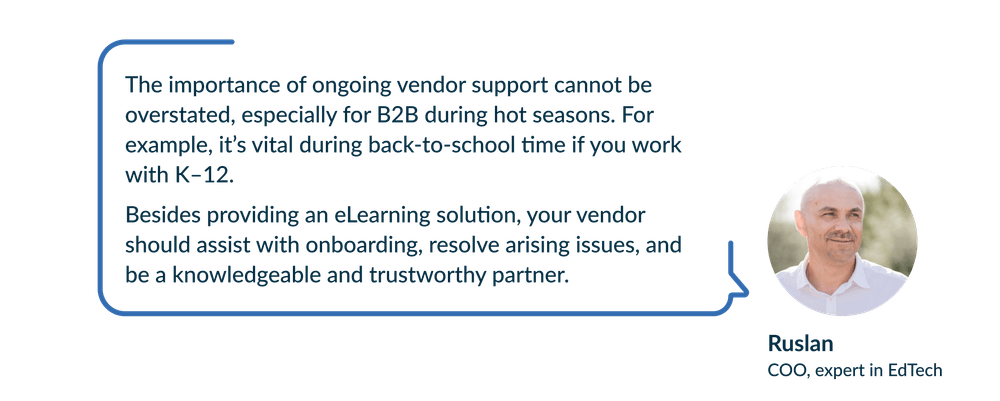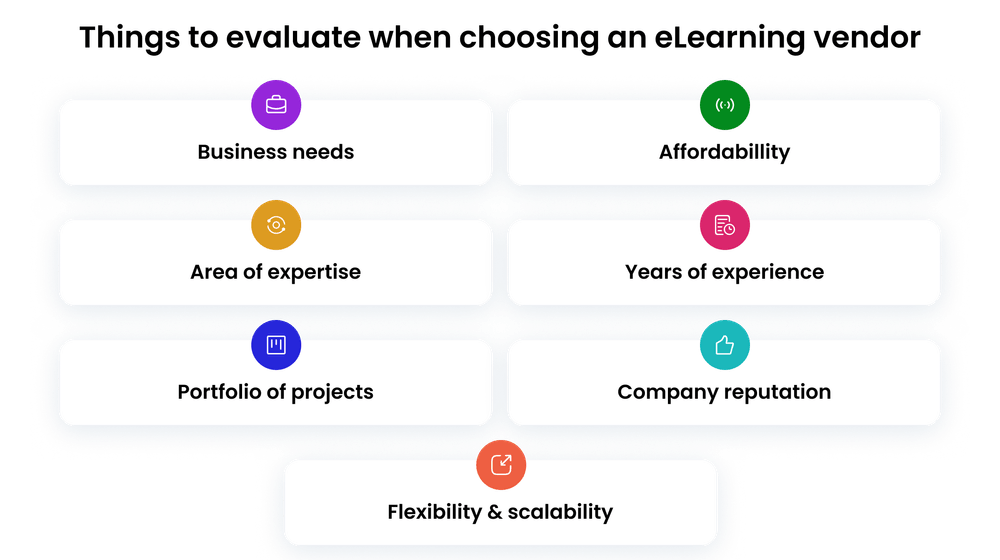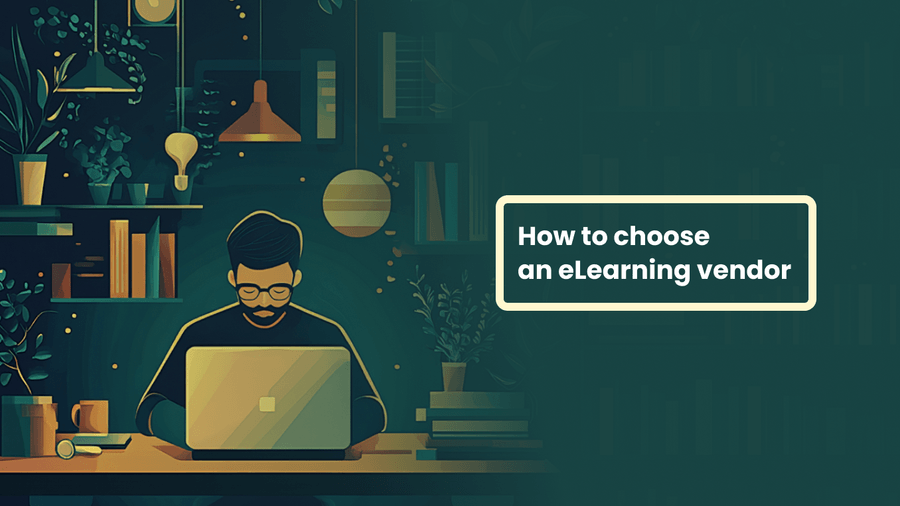Did you know that the eLearning industry has grown by more than 900% since 2000? And it’s not going to stop!
The global eLearning market is expected to reach 1515.97 billion USD by 2033.
To make the most of it, you should choose an eLearning vendor meticulously. Read our article and learn how to pick the best option.
1. Why turn to an eLearning vendor at all?
First of all, industry-focused eLearning vendors are experienced professionals. They understand the EdTech domain, its challenges, opportunities, and offer innovative solutions.
Whether you’re seeking a corporate training solution for your employees or you’re a content provider for K-12 schools, a reliable vendor should be able to:
- Offer a solution that improves your business efficiency and reduces costs.
- Consult you on the necessary standards compliance (OneRoster, WCAG, etc).
- Assist with integrations (e.g., with your corporate systems).
- Provide ongoing customer support.
- Share expertise and bring new perspectives to a project.
- Much more.

Partnering with a reliable vendor allows you to expand their relationship beyond initial implementation, focusing on growth and enhancing their offerings, which benefits both parties.
To reap all these benefits, it��’s vital to make an informed choice. Let’s see how to do it.
2. Which things should I evaluate?
To ensure you make the right choice, there are important factors you need to consider. A thorough and strategic evaluation will help you find the vendor that can efficiently meet your business needs.

Business needs
As usual, the first step toward selecting a vendor is to analyze your business needs.
What makes your business unique? Which tools do you need to achieve your goals?
Once you analyze your organization’s objectives, customer base, and offers, you’ll search for suppliers capable of meeting your requirements.
Affordability
As a business, you need to consider profitability. When you partner with an expensive vendor, it directly impacts your bottom line negatively. Your goal should be to strike the balance between high quality and affordability.
Affordability and durability can coexist. Your responsibility is to take your time to find a vendor that offers both.
Area of expertise
This sounds pretty logical. Yet we can’t help but mention it. You have to consider the vendor’s area of expertise — the EdTech domain.
Generally, a company that specializes in the eLearning industry is expected to be more efficient and focused than an organization that isn’t industry-focused.
As we’ve mentioned above, a good vendor should be able to not only develop a solution but resolve any related issues your company faces.
Whether it’s eLearning standards compliance or integrations with existing systems, an eLearning solution provider should be a trusted partner who will help you out.
Years of experience
As part of the background check, ascertain the number of years a company has served the eLearning industry before working with them. The longer a company is in business, the higher the expertise it will have.
This does not mean that new vendors can not deliver great products; however, a provider that has been in business for 10+ years is expected to have more expertise and experience than a new one.
If you are considering settling for a new provider, make sure they have people with many years of experience within their workforce and leadership.
Portfolio of projects
Checking projects a company has executed is a proven way to know if its results match its promises. Beyond the testimonials you see online, you should explore portfolios, request a solution demo, or ask for a proof-of-concept (PoC).
Taking a thorough look at project examples will give a comprehensive idea of what to expect from them. Two things are important here: quality of work and expertise in the type of product you need.
Company reputation
This is probably the factor that reveals where a provider stands on other criteria. Knowing what past and existing clients think about a company will help you decide if they are a good fit.
Establish reliable sources of testimonials, ask for references and do your research. Any reliable vendor will have grateful clients, ready to share their experience.
Flexibility & scalability
In the electronic learning industry, demands fluctuate. That’s why you should look for a vendor that can scale up or down based on demand.
In addition, consider multi-device access. People no longer rely on one device.
For example, 70% of learners are more motivated to learn when they use mobile devices instead of computers.
3. Which mistakes to avoid?
If you take into consideration all the things above, you’re going to be fine. Yet, we’ll provide you with some more tips to avoid common mistakes and enhance your selection process.
Not assessing technical capabilities
Verify that the eLearning vendor has the tech capabilities to create the kind of course or any other content you want.
For instance, does the company provide integration services, or is it capable of producing videos, gamification, or AI tools?
It is better to be aware of the developer’s limitations early on.
Forgetting about WCAG-compliance
In the US, Canada, and many other countries, software is legally obliged to be accessible. Especially so if you provide public services, like education.
Most developed countries have regulations that govern accessibility. For example, in the US, there are ADA, Section 504, and Section 508.
Therefore, it’s important to choose a vendor that knows how to develop WCAG-compliant eLearning software.

Prioritizing costs over ROI
Of course, costs are crucial, but they should not be the sole or primary factor in decision-making.
It is important to strike a balance between cost and value to ensure that the investment yields positive results and leads to increased revenue.
In fact, 42% of organizations experience an increase in revenue after introducing eLearning to their workplace.
4. Which questions to ask the eLearning vendor?
Well, it mostly depends on your needs and requirements. Don’t hesitate to ask eLearning providers everything that concerns you.
Here are some question ideas that you may find useful:
- Do users require special training to utilize the eLearning solution effectively?
- Is it possible to transfer and export my data without restrictions?
- How will you store and protect my learner and business data?
- Do you provide customer support after implementing a solution?
What’s more, you can use such a tool as Request for Proposal (RFP) for communication with candidates. RFP serves as a formal invitation for potential vendors to submit their proposals.
It mentions all the necessary technical requirements, criteria, features, and goals to be achieved. You can read more about using RFP and ways to craft it here.
5. Where to find the best eLearning vendor?
No need to go far. We came up with a list of the top eLearning development companies in 2024. It includes very different options, so everyone can find their perfect match.
If you feel that our Aristek team can be of service to you, reach out. We offer a free consultation to answer all the questions you may have.




